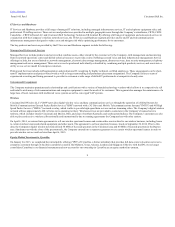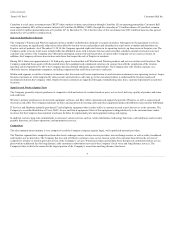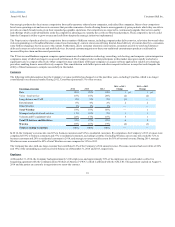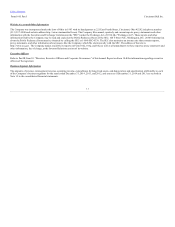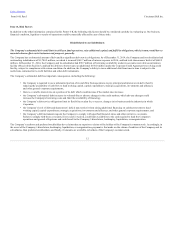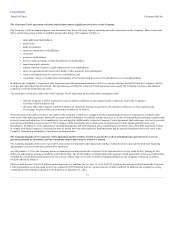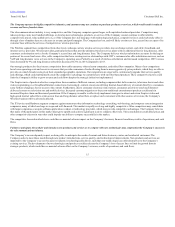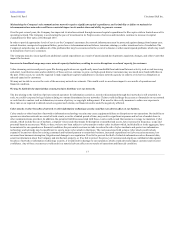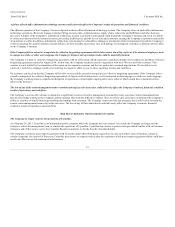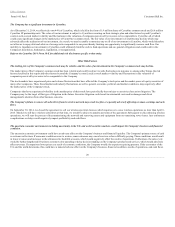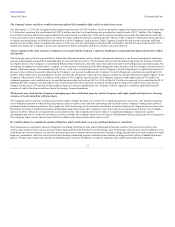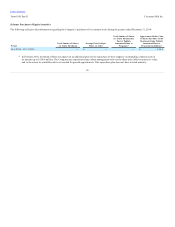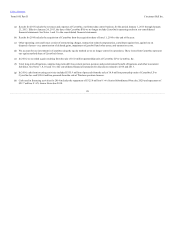Cincinnati Bell 2014 Annual Report Download - page 18
Download and view the complete annual report
Please find page 18 of the 2014 Cincinnati Bell annual report below. You can navigate through the pages in the report by either clicking on the pages listed below, or by using the keyword search tool below to find specific information within the annual report.
Table of Contents
Form 10-K Part I
Cincinnati Bell Inc.
Natural disasters, terrorist acts or acts of war could cause damage to our infrastructure and result in significant disruptions to our operations.
Our business operations are subject to interruption by natural disasters, power outages, terrorist attacks, other hostile acts and events beyond our control.
Such events could cause significant damage to our infrastructure, resulting in degradation or disruption of service to our customers. While we maintain
insurance coverage for some of these events, the potential liabilities associated with these events could exceed the insurance coverage we maintain. Our
system redundancy may be ineffective or inadequate and our disaster recovery planning may not be sufficient for all eventualities. These events could also
damage the infrastructure of suppliers that provide us with the equipment and services we need to operate our business and provide products to our
customers. A natural disaster or other event causing significant physical damage would cause us to experience substantial losses resulting in significant
recovery time and expenditures to resume operations. In addition, these occurrences could result in lost revenues from business interruption as well as
damage to our reputation.
The regulation of the Company’s businesses by federal and state authorities may, among other things, place the Company at a competitive disadvantage,
restrict its ability to price its products and services, and threaten its operating licenses.
Several of the Company’s subsidiaries are subject to regulatory oversight of varying degrees at both the state and federal levels, which may differ from the
regulatory scrutiny faced by the Company’s competitors. A significant portion of CBT’s revenue is derived from pricing plans that require regulatory
overview and approval. These regulated pricing plans limit the rates CBT charges for some services while the competition has typically been able to set rates
for services with limited restriction. In the future, regulatory initiatives that would put CBT at a competitive disadvantage or mandate lower rates for its
services would result in lower profitability and cash flows for the Company. In addition, different regulatory interpretations of existing regulations or
guidelines may affect the Company’s revenues and expenses in future periods.
At the federal level, CBT is subject to the Telecommunications Act of 1996 (the "1996 Act"), including the rules subsequently adopted by the FCC to
implement the 1996 Act, which has impacted CBT’s in-territory local exchange operations in the form of greater competition. At the state level, CBT
conducts local exchange operations in portions of Ohio, Kentucky, and Indiana, and, consequently, is subject to regulation by the Public Utilities
Commissions in those states. Various regulatory decisions or initiatives at the federal or state level may from time to time have a negative impact on CBT’s
ability to compete in its markets.
From time to time, different regulatory agencies conduct audits to ensure that the Company is in compliance with the respective regulations. The Company
could be subject to fines and penalties if found to be out of compliance with these regulations, and these fines and penalties could be material to the
Company’s financial condition.
There are currently many regulatory actions under way and being contemplated by federal and state authorities regarding issues that could result in
significant changes to the business conditions in the telecommunications industry. In addition, in connection with our Internet access offerings, we could
become subject to laws and regulations as they are adopted or applied to the Internet. There is currently only limited regulation applicable to these services.
As the significance of the Internet continues to grow, federal, state and local governments may pass laws and adopt rules and regulations or apply existing
laws and regulations to the Internet (including Internet access services), and related matters are under consideration in both federal and state legislative and
regulatory bodies. We cannot provide any assurances that changes in current or future regulations adopted by the FCC or state regulators, or other legislative,
administrative, or judicial initiatives relating to the telecommunications industry, will not have a material adverse effect on the Company’s business,
financial condition, results of operations, and cash flows.
The Company depends on a number of third-party providers, and the loss of, or problems with, one or more of these providers may impede the Company's
growth or cause it to lose customers.
The Company depends on third-party providers to supply products and services. For example, many of the Company's information technology and call center
functions are performed by third-party providers, and network equipment is purchased from and maintained by vendors. The loss of, or problems with one or
more of these third-party providers may result in an adverse effect on our ability to provide products and services to our customers and on our results of
operations and financial condition.
18


